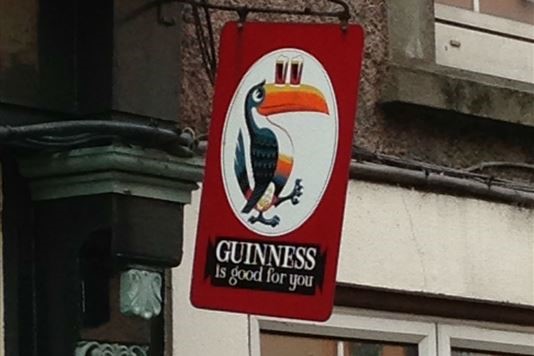Is Guinness really good for you?

My first ever Guinness, cautiously sipped on an Irish holiday, made me feel Herculean. Surely there must be some truth to the ‘Guinness is good for you’ ad campaign of the 1920s?
A farmer pulling a cart with his horse on board; a man lifting a huge iron bar with just one arm; and a passer-by hoisting a tanker to let a duck cross the road… the iconic ‘Guinness gives you strength’ adverts of the 1920s (or 'you are the better for Guinness,' as the image below reads in Gaelic) still decorate the streets of southwest Ireland. They are beautifully painted on the side of buildings, or hung as rusty signs above pub doors.
 Having spent all day surrounded by them in the picturesque town of Kenmare, County Kerry, I felt a strong desire to try Guinness. The setting was perfect: we were in Crowleys, a traditional Irish pub, listening to locals play the bodhrán when I took that first glorious sip. It tasted bitter, creamy, strong, dark and like chocolate, and by the end of the night I’d drunk a pint and a half of the stuff – a boozing record for me.
Having spent all day surrounded by them in the picturesque town of Kenmare, County Kerry, I felt a strong desire to try Guinness. The setting was perfect: we were in Crowleys, a traditional Irish pub, listening to locals play the bodhrán when I took that first glorious sip. It tasted bitter, creamy, strong, dark and like chocolate, and by the end of the night I’d drunk a pint and a half of the stuff – a boozing record for me.
But what I noticed, more so than the taste, was how fantastic Guinness made me feel. Not in the alcohol-makes-you-merry sense; rather, how energetic and bright-eyed I became. I still felt mighty the next morning, and so my companion and I thought it best to stick to a tight schedule of Guinness half-pints for the rest of the holiday. I was on top form all week.
Even the dogs are on it
So what was in the Guinness that made me feel great? The basis for the 1920s campaign wasn’t scientific – customers simply told the company that drinking the black stuff (which is actually a deep shade of ruby red) made them feel good. It’s a type of advertising that is now prohibited in Ireland, although the vintage signs we saw were still pulling punters in.
 Since the ban, Dublin-based Guinness has never claimed that the drink has health benefits. "We take great care to market all our products in a responsible manner," the company's spokesperson told me. But a BBC news article in 2003 said that a pint of Guinness a day may help ‘prevent heart clots that raise the risk of heart attacks’. The conclusions were based on an experiment conducted at the University of Wisconsin, which gave Guinness to dogs with narrowed arteries similar to those in human heart disease cases. The stout reduced clotting activity in their blood, while another group of dogs who were given lager instead showed no changes.
Since the ban, Dublin-based Guinness has never claimed that the drink has health benefits. "We take great care to market all our products in a responsible manner," the company's spokesperson told me. But a BBC news article in 2003 said that a pint of Guinness a day may help ‘prevent heart clots that raise the risk of heart attacks’. The conclusions were based on an experiment conducted at the University of Wisconsin, which gave Guinness to dogs with narrowed arteries similar to those in human heart disease cases. The stout reduced clotting activity in their blood, while another group of dogs who were given lager instead showed no changes.
But The British Dietetic Association is sceptical about the relationship between alcohol and heart health. "Some recent research has suggested that the observed benefit of alcohol on heart health may instead be associated with the relaxation and social aspect of alcohol consumption," said spokesperson Aisling Pigott. "I would certainly not recommend that anybody starts drinking Guinness to help their heart!” she added.
Calorific myth
Then there’s the calorific content – not as bad as you might think. I’ve heard the ‘a pint of Guinness sports the same calories as a roast dinner’ rumour both in England and Ireland. In actual fact, each one only contains about 175 calories – that’s less than a pint of orange juice or milk. And according to patient.co.uk, every Guinness (which is made from four key ingredients: barley, hops, water, and a strain of yeast descended down the years from Arthur Guinness’s time) includes 2g protein, 1mg iron and all the B vitamins except B12.
Will it make me strong?
 I think it must have been the shot of iron that pepped me up. My grandad, who used to be a pub landlord, forced the stuff on my mum after she gave birth, and post-operative patients in England were encouraged to drink Guinness in their hospital beds.
I think it must have been the shot of iron that pepped me up. My grandad, who used to be a pub landlord, forced the stuff on my mum after she gave birth, and post-operative patients in England were encouraged to drink Guinness in their hospital beds.
I put the question to beer expert Melissa Cole, who quickly dashed my theory: “I’m going to have to burst your bubble I’m afraid! Guinness and other beers don’t contain any iron at all… if they did, it would destroy the yeast in them straight away.”
The British Dietetic Association agree. Aisling Pigott described it as "a common myth" and said that in order to get her daily Recommended Nutrient Intake (RNI), a woman would have to drink almost 50 pints of Guinness a day.
It's a mystery
So if it’s not the iron (although some still say that Guinness contains it, albeit a small amount), what on earth is it? Perhaps a mysterious ingredient that we’re unaware of – or a touch of Irish spirit inside every glass.
Let's get Melissa's thoughts: “I think the reason why beer carries this ‘good for you’ reputation is because, prior to mass production, beer would have been full of carbohydrates and protein. And to, say, a poor nursing mother who doesn’t get many nutrients in her diet, it would have helped.
“But for you, in 2013 Ireland, the reason you felt great was because you were on holiday, having fun and trying something new!”
Lovefood editor Andrew is of a similar opinion. “It was definitely the alcohol that made you happy,” he insisted.
This is a classic lovefood article
What do you think? Do you feel better after a pint of Guinness? Or is all alcohol bad for you? Share your feelings in the comments box below.
Guinness pint image courtesy of Sami Keinänen
You might also like
Comments
Be the first to comment
Do you want to comment on this article? You need to be signed in for this feature